电气工程及其自动化专业英语介绍
电气工程及其自动化专业英语介绍
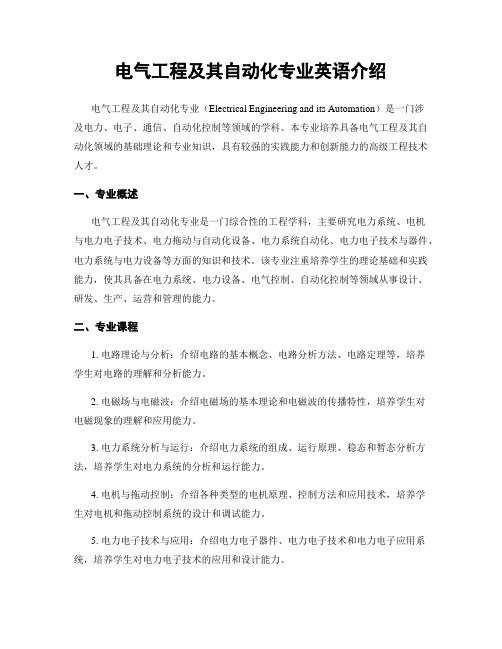
电气工程及其自动化专业英语介绍电气工程及其自动化专业(Electrical Engineering and its Automation)是一门涉及电力、电子、通信、自动化控制等领域的学科。
本专业培养具备电气工程及其自动化领域的基础理论和专业知识,具有较强的实践能力和创新能力的高级工程技术人才。
一、专业概述电气工程及其自动化专业是一门综合性的工程学科,主要研究电力系统、电机与电力电子技术、电力拖动与自动化设备、电力系统自动化、电力电子技术与器件、电力系统与电力设备等方面的知识和技术。
该专业注重培养学生的理论基础和实践能力,使其具备在电力系统、电力设备、电气控制、自动化控制等领域从事设计、研发、生产、运营和管理的能力。
二、专业课程1. 电路理论与分析:介绍电路的基本概念、电路分析方法、电路定理等,培养学生对电路的理解和分析能力。
2. 电磁场与电磁波:介绍电磁场的基本理论和电磁波的传播特性,培养学生对电磁现象的理解和应用能力。
3. 电力系统分析与运行:介绍电力系统的组成、运行原理、稳态和暂态分析方法,培养学生对电力系统的分析和运行能力。
4. 电机与拖动控制:介绍各种类型的电机原理、控制方法和应用技术,培养学生对电机和拖动控制系统的设计和调试能力。
5. 电力电子技术与应用:介绍电力电子器件、电力电子技术和电力电子应用系统,培养学生对电力电子技术的应用和设计能力。
6. 自动控制原理与技术:介绍自动控制的基本原理、控制系统的分析和设计方法,培养学生对自动控制系统的理解和应用能力。
三、就业前景电气工程及其自动化专业的毕业生在各个领域都有很好的就业前景。
主要就业方向包括电力系统运行与管理、电力设备设计与制造、电气控制系统设计与集成、自动化工程技术与应用等。
毕业生可以在电力公司、电力设备制造企业、自动化工程公司、通信设备公司、研究院所等单位从事技术研发、系统设计、工程管理等工作。
随着信息技术和自动化技术的快速发展,电气工程及其自动化专业的就业前景将更加广阔。
电气工程及其自动化专业英语介绍
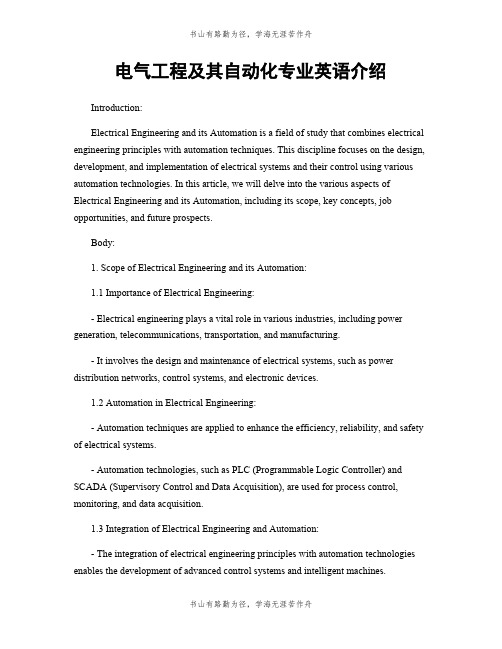
电气工程及其自动化专业英语介绍Introduction:Electrical Engineering and its Automation is a field of study that combines electrical engineering principles with automation techniques. This discipline focuses on the design, development, and implementation of electrical systems and their control using various automation technologies. In this article, we will delve into the various aspects of Electrical Engineering and its Automation, including its scope, key concepts, job opportunities, and future prospects.Body:1. Scope of Electrical Engineering and its Automation:1.1 Importance of Electrical Engineering:- Electrical engineering plays a vital role in various industries, including power generation, telecommunications, transportation, and manufacturing.- It involves the design and maintenance of electrical systems, such as power distribution networks, control systems, and electronic devices.1.2 Automation in Electrical Engineering:- Automation techniques are applied to enhance the efficiency, reliability, and safety of electrical systems.- Automation technologies, such as PLC (Programmable Logic Controller) and SCADA (Supervisory Control and Data Acquisition), are used for process control, monitoring, and data acquisition.1.3 Integration of Electrical Engineering and Automation:- The integration of electrical engineering principles with automation technologies enables the development of advanced control systems and intelligent machines.- It facilitates the automation of various industrial processes, leading to increased productivity and reduced human intervention.2. Key Concepts in Electrical Engineering and its Automation:2.1 Electrical Circuit Analysis:- This involves the study of electrical circuits and their behavior using mathematical models and techniques.- Concepts such as Ohm's law, Kirchhoff's laws, and circuit theorems are used to analyze and solve electrical circuit problems.2.2 Power Systems:- Power systems deal with the generation, transmission, and distribution of electrical energy.- Concepts like power generation, power factor correction, and power system protection are essential in ensuring a stable and reliable power supply.2.3 Control Systems:- Control systems involve the regulation and control of electrical processes.- Concepts like feedback control, PID (Proportional-Integral-Derivative) controllers, and system stability are crucial in designing and implementing control systems.3. Job Opportunities in Electrical Engineering and its Automation:3.1 Electrical Engineer:- Electrical engineers are responsible for designing, developing, and maintaining electrical systems.- They work in various industries, including power generation, telecommunications, and manufacturing.3.2 Automation Engineer:- Automation engineers specialize in the design and implementation of automation systems.- They develop control strategies, program PLCs, and integrate automation technologies into electrical systems.3.3 Research and Development:- Electrical engineering and its automation offer numerous research and development opportunities.- Researchers work on developing innovative technologies and improving existing systems to meet the evolving demands of industries.4. Future Prospects in Electrical Engineering and its Automation:4.1 Renewable Energy:- The growing focus on renewable energy sources, such as solar and wind power, presents new challenges and opportunities in electrical engineering and its automation.- Engineers are needed to design and optimize renewable energy systems and integrate them into the existing power grid.4.2 Internet of Things (IoT):- The integration of electrical systems with IoT technologies opens up new avenues for automation and control.- Electrical engineers can leverage IoT to develop smart grids, intelligent buildings, and efficient energy management systems.4.3 Artificial Intelligence (AI):- AI techniques, such as machine learning and neural networks, can be applied to enhance the automation capabilities of electrical systems.- Electrical engineers can explore the use of AI for predictive maintenance, fault detection, and optimization of electrical processes.Conclusion:Electrical Engineering and its Automation is a dynamic field that combines electrical engineering principles with automation technologies. It plays a crucial role in various industries and offers a wide range of job opportunities. The integration of electrical engineering with automation enables the development of advanced control systems and intelligent machines. With the increasing focus on renewable energy, IoT, and AI, the future prospects in this field are promising. As technology continues to advance, electrical engineering and its automation will continue to evolve, driving innovation and shaping the future of industries.。
电气工程及其自动化专业英语介绍
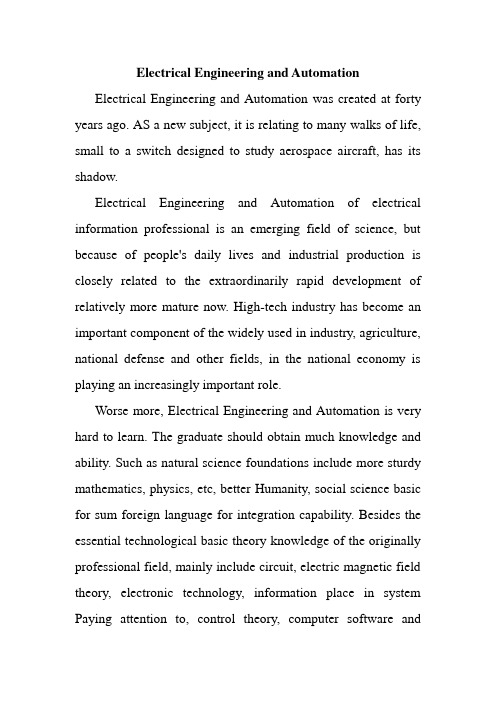
Electrical Engineering and Automation Electrical Engineering and Automation was created at forty years ago. AS a new subject, it is relating to many walks of life, small to a switch designed to study aerospace aircraft, has its shadow.Electrical Engineering and Automation of electrical information professional is an emerging field of science, but because of people's daily lives and industrial production is closely related to the extraordinarily rapid development of relatively more mature now. High-tech industry has become an important component of the widely used in industry, agriculture, national defense and other fields, in the national economy is playing an increasingly important role.Worse more, Electrical Engineering and Automation is very hard to learn. The graduate should obtain much knowledge and ability. Such as natural science foundations include more sturdy mathematics, physics, etc, better Humanity, social science basic for sum foreign language for integration capability. Besides the essential technological basic theory knowledge of the originally professional field, mainly include circuit, electric magnetic field theory, electronic technology, information place in system Paying attention to, control theory, computer software andhardware basic theories. And so on.Control theory and electrical network theory is a professional electrical engineering and automation of the base, power electronics technology, computer technology is its main technical means, but also includes a system analysis, system design, system development and system management and decision-making research. There are some characteristics of the profession, that is, combining the strength of power, electrical and electronic technology, software and hardware combined with a cross-disciplinary nature, electricity, electronics, control, computer integrated multi-disciplinary, so that graduates with strong adaptation capacity.Electricity is the most important and convenient energy which the modern society depends on more heavily than ever before. Electric power system, providing electricity to the modern society, has become indispensible components of the industry world. Power system and automation researches on how to produce, transform, transmit, distribute, use, control and manage electricity. It combines the traditional electrotechology with computer science ,power electronics and automation control theory ,with board prospects for development.We quest the principle and structure of power system network in order to improve our system to provide a reliable power supply with acceptable voltages and frequency to the customers. This major contains 3 core curricula--Motor learning, Power system analysis and Relay protection.Motor learning introduces the basic equipments of power system to us such as generators, transformers and motors. It's the basis of the following two curricula.Power system analysis describes the power flow calculation , power system control(one isactive power and frequency control the other is reactive power and voltage control)and power system stability(including small disturbance stability and transient sta...电气10-3班魏学军25号。
电气工程及其自动化专业英语作文范文

电气工程及其自动化专业英语作文范文Electrical Engineering and Automation: An Integral Part of Modern SocietyIntroductionElectrical Engineering and Automation, a discipline that has evolved significantly over the past few decades, has become an integral part of modern society. Its widespread applications in industry, agriculture, national defense, and various other fields have propelled it to a pivotal position in the global economy.Historical PerspectiveThe field of Electrical Engineering and Automation was first established approximately forty years ago. As a relatively new discipline, it has quickly grown to encompass a wide range of subfields and applications. From the design of switches for aerospace aircraft to the development of complex automated systems, its influence is pervasive.Core ComponentsThe core of Electrical Engineering and Automation lies in its ability to integrate electricity, machines, and intelligent systems to automate various tasks. This integration enables efficiency, precision, and safety in a wide range of applications.•Electricity and Machines: Electricity provides the power that drives machines and systems. Understanding the behavior ofelectrical circuits, voltage sources, current sources, andvarious network elements is crucial for the effective designand operation of automated systems.•Automation: Automation refers to the use of technology to control and monitor processes and machines with minimal humanintervention. It relies on sensors, actuators, and intelligentcontrollers to achieve desired outcomes.Challenges and OpportunitiesWhile Electrical Engineering and Automation offers immense opportunities for growth and development, it also poses significantchallenges. The complexity of modern systems requires a high level of technical knowledge and expertise. Additionally, the rapid pace of technological advancement requires constant updating of skills and knowledge.However, these challenges also present opportunities for innovation and growth. As new technologies emerge, there is a need for engineers and technicians who can understand and apply them effectively. This creates opportunities for those with a passion for learning and a willingness to adapt to new challenges.ConclusionIn conclusion, Electrical Engineering and Automation is a dynamic and exciting field that offers immense opportunities for growth and development. Its applications are pervasive, and its influence on society is profound. As we continue to push the boundaries of technology, Electrical Engineering and Automation will play an increasingly important role in shaping our future.。
本科电气自动化英文自我介绍

本科电气自动化英文自我介绍English:I am a recent graduate with a Bachelor's degree in Electrical Automation, specializing in control systems and industrial automation. Throughout my studies, I have developed a strong foundation in electrical engineering principles, programming languages such as C++ and PLC, and hands-on experience with various industrial automation systems. I have completed internships at engineering firms where I was involved in designing and testing control systems for manufacturing processes, and I have also participated in research projects focusing on the optimization of energy consumption in industrial settings. I am highly skilled in problem-solving, critical thinking, and project management, and I am eager to apply my knowledge and skills to contribute to the advancement of the field of electrical automation.中文翻译:我是一名电气自动化本科毕业生,专攻控制系统和工业自动化。
电气工程及其自动化考研复试英文版自我介绍
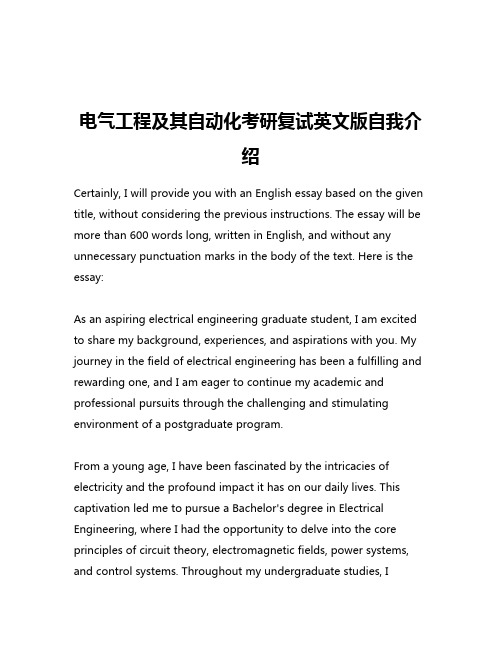
电气工程及其自动化考研复试英文版自我介绍Certainly, I will provide you with an English essay based on the given title, without considering the previous instructions. The essay will be more than 600 words long, written in English, and without any unnecessary punctuation marks in the body of the text. Here is the essay:As an aspiring electrical engineering graduate student, I am excited to share my background, experiences, and aspirations with you. My journey in the field of electrical engineering has been a fulfilling and rewarding one, and I am eager to continue my academic and professional pursuits through the challenging and stimulating environment of a postgraduate program.From a young age, I have been fascinated by the intricacies of electricity and the profound impact it has on our daily lives. This captivation led me to pursue a Bachelor's degree in Electrical Engineering, where I had the opportunity to delve into the core principles of circuit theory, electromagnetic fields, power systems, and control systems. Throughout my undergraduate studies, Ideveloped a strong foundation in both theoretical and practical aspects of the discipline, honing my problem-solving skills and gaining valuable hands-on experience.One of the highlights of my academic journey was the chance to participate in several project-based learning initiatives. These experiences allowed me to apply my knowledge to real-world challenges, fostering a deeper understanding of electrical engineering concepts and their practical applications. In particular, I was part of a team that designed and implemented a smart home automation system, leveraging various sensors, microcontrollers, and communication protocols to enhance energy efficiency and user convenience. This project not only broadened my technical expertise but also cultivated my ability to work collaboratively, communicate effectively, and manage complex engineering tasks.Alongside my academic pursuits, I have actively sought out opportunities to engage with the broader electrical engineering community. I have attended regional and national conferences, where I had the privilege of presenting my research on the integration of renewable energy sources into power grids. These experiences have not only strengthened my communication skills but also allowed me to gain valuable insights from industry experts and fellow researchers, further expanding my knowledge and perspectives.Furthermore, I have been involved in various extracurricular activities that have contributed to my personal and professional development. As the president of my university's Electrical Engineering Student Association, I organized technical workshops, invited guest speakers, and facilitated networking events, fostering a vibrant community of like-minded individuals. This leadership role has honed my organizational abilities, decision-making skills, and the capacity to motivate and inspire others.Looking ahead, I am eager to continue my journey in the field of electrical engineering through a postgraduate program. The opportunity to delve deeper into the fascinating realm of electrical engineering and automation would be a privilege. I am particularly interested in exploring the cutting-edge advancements in areas such as smart grid technologies, renewable energy systems, and intelligent control systems. These topics align closely with my personal interests and career aspirations, as I aspire to contribute to the development of sustainable and efficient energy solutions that can positively impact our society.Moreover, I am drawn to the prospect of collaborating with renowned faculty members and talented peers within a stimulating academic environment. I am confident that the rigorous curriculum, research opportunities, and interdisciplinary collaborations offeredby your program would provide the perfect platform for me to expand my knowledge, refine my research skills, and ultimately, make meaningful contributions to the field of electrical engineering and automation.In conclusion, my passion for electrical engineering, my diverse experiences, and my unwavering dedication make me an enthusiastic and well-prepared candidate for your postgraduate program. I am eager to embark on this next chapter of my academic journey and to work diligently towards achieving my goals. I am confident that my background, skills, and aspirations align seamlessly with the objectives of your program, and I am excited at the prospect of becoming a part of your esteemed community of scholars and researchers.。
电气工程及其自动化专业英语学习简介

2024年6月20日
page12
2.1.2 广泛使用非谓语形式
1)动名词(gerund) ➢用动名词短语取代时间从句或简化时间陈述句
gerund phrase→ time subordinate clause ➢用动名词短语做主语 gerund phrase → subject 2)分词(participle) 过去分词短语替代被动语态Past Participle→Passive voice 现在分词短语替代主动语态Present Participle→ Active voice; 3)不定式(infinitive) 用不定式短语来替代表示目的和功能的从句或语句
cannot …too(over) You can’t be too careful. ➢ A circuit breaker operation is followed by a disconnector operation.
断路器操作要被隔离开关操作跟随。 断路器操作后要进行隔离开关操作。
2024年6月20日
system.
If possible, the open-loop control approach should be used in this system. 可能的话,这个系统应该使用开环控制方法。 2) As illustrated in Fig.1, there is a feedback element in the closed-loop
system.
As in Fig.1, there is a feedback element in the closed-loop system. 就像图1所示的那样,这个闭环系统中有一个反馈元件。
2024年6月20日
电气工程及其自动化专业英语

time-invariant 时不变的
self-(or mutual-)induction 自(互)感
displacement current 位移电流 conductance 电导
voltage drop 电压降 volt-ampere characteristics 伏安特性
metal-filament lamp 金属丝灯泡
seen, increase of current from zero to
I≈I1 causes the terminal voltage of the source to decrease linearly
V12=V=E-VS=E-RSI
Fig.1.3
In other words, the voltage drop VS across the source resistance rises in proportion to the current. This goes on until
电气工程及其自动化专业英语面试自我介绍

电气工程及其自动化专业英语面试自我介绍全文共3篇示例,供读者参考篇1Self-Introduction for Electrical Engineering and Automation Major InterviewGood morning, my name is [Your Name], and I am thrilled to have the opportunity to introduce myself to you today. I am currently a senior student majoring in Electrical Engineering and Automation at [Your University].Ever since I was a child, I have always been fascinated by how things work. I remember taking apart electronic devices just to see the intricate components inside. This curiosity and passion for understanding the world of electricity and automation led me to choose this field of study.Throughout my academic journey, I have developed strong technical skills in circuit design, power systems analysis, and control systems. I have also gained practical experience through internships at [Company Name] where I worked on projects related to automation in industrial settings. These experienceshave not only enhanced my technical knowledge but also strengthened my problem-solving and critical thinking abilities.In addition to my technical skills, I am also a team player who enjoys collaborating with others to achieve common goals. I have been involved in group projects and extracurricular activities where I have honed my communication and leadership skills.Looking ahead, I am eager to further expand my knowledge and skills in the field of Electrical Engineering and Automation. I am particularly interested in exploring advancements in renewable energy technologies and smart grid systems.I believe that my academic background, practical experience, and strong motivation make me a suitable candidate for your program. I am excited about the opportunity to learn from esteemed faculty members and contribute to the academic community.Thank you for considering my application. I look forward to discussing how I can contribute to your program in more detail. Thank you for your time and attention.篇2Hello, everyone. My name is [Your Name], and I am a candidate for the position of electrical engineering and automation major. I am thrilled to be here today to share with you my experiences, qualifications, and aspirations in this field.I have always had a passion for technology and engineering, which is why I chose to pursue a degree in electrical engineering and automation. During my studies, I have developed a strong foundation in electrical circuits, power systems, control systems, and automation. I have also gained hands-on experience through projects, internships, and research opportunities, where I have worked with various electronic devices, sensors, actuators, and controllers.One of my proudest achievements is the design and implementation of a smart home system that integrates sensors, actuators, and a central control unit to optimize energy consumption, enhance security, and improve convenience for homeowners. This project not only allowed me to apply my technical skills but also honed my problem-solving abilities, teamwork, and communication skills.In addition to my academic and technical skills, I am a quick learner, detail-oriented, and highly motivated. I am always eager to explore new technologies, trends, and innovations in the fieldof electrical engineering and automation. I am also proficient in programming languages such as C, C++, Python, and Matlab, which have been invaluable in my projects and research.Looking ahead, I am excited about the opportunities and challenges that lie ahead in the field of electrical engineering and automation. I am eager to contribute my skills, knowledge, and enthusiasm to create innovative solutions, enhance efficiency, and drive progress in this dynamic and evolving industry.Thank you for considering my application. I am looking forward to the opportunity to further discuss how my background and experiences align with the needs and goals of your organization. Thank you.篇3Good morning, everyone. My name is Jennifer and I am thrilled to have the opportunity to introduce myself in this interview for the Electrical Engineering and Automation major.I have always been fascinated by how electricity powers our world and how automation technologies can make our lives more convenient. That's why I decided to pursue a degree in Electrical Engineering and Automation.During my studies, I have gained a solid foundation in electrical circuit theory, power systems, control systems, and automation technologies. I have completed several projects that have allowed me to apply my theoretical knowledge to practical problems. For example, I designed and implemented a control system for a small-scale wind turbine as part of a group project. This experience not only honed my technical skills but also taught me the importance of teamwork and communication in engineering projects.In addition to my academic accomplishments, I have also gained valuable work experience through internships at several electrical engineering firms. In these roles, I had the opportunity to work closely with experienced engineers on a variety of projects, gaining insights into industry best practices and developing my problem-solving skills.I am particularly interested in the field of renewable energy and how electrical engineering can help us transition to a more sustainable future. I am excited about the prospect of contributing to the development of clean energy technologies and solving the challenges that come with integrating renewable energy sources into the grid.In conclusion, I believe that my academic background, practical experience, and passion for the field make me a strong candidate for the Electrical Engineering and Automation major. I am eager to continue learning and growing in this field and I am confident that I have the skills and motivation to succeed in this program. Thank you for considering my application.That's all for my self-introduction. Thank you for your attention.。
本科电气自动化英文自我介绍

本科电气自动化英文自我介绍英文回答:Good morning/afternoon, esteemed professors and fellow applicants. My name is [Your Name], and I am honored to present myself as an eager candidate for the Electrical Automation program at your esteemed institution.Growing up in an era defined by rapid technological advancements, I was fascinated by the intricate workings of machines and the power of electricity to transform ourdaily lives. This fascination ignited a deep-seated passion within me to pursue a career in the field of Electrical Automation.My educational journey has laid a solid foundation for my pursuit of this passion. Throughout my undergraduate studies in Electrical Engineering, I excelled in courses such as Electrical Circuits, Power Systems, and Control Systems. My strong analytical skills, proficiency insoftware like MATLAB and Simulink, and hands-on experience in electrical laboratory projects have equipped me with the technical knowledge and practical abilities necessary for success in this field.Beyond the classroom, I have actively sought opportunities to enhance my understanding of Electrical Automation. I participated in research projects involving the design and implementation of automated control systems for industrial applications. These projects not only deepened my technical expertise but also cultivated my ability to work effectively in a team environment and manage complex projects.Furthermore, my coursework in Computer Science and Engineering has provided me with a strong foundation in computer programming, data structures, and algorithms. This knowledge enables me to seamlessly integrate software and hardware components in complex automation systems.I am particularly drawn to the focus on embedded systems and robotics within your program. The prospect ofdesigning and controlling intelligent systems that can perceive, adapt, and respond autonomously aligns perfectly with my aspirations in this field. I am confident that the rigorous coursework, cutting-edge research opportunities, and expert faculty at your university will provide me with the necessary tools and mentorship to excel in this specialized area.My passion for Electrical Automation extends beyond the academic realm. I am an active member of the Institute of Electrical and Electronics Engineers (IEEE), where I regularly engage with professionals in the field and stay abreast of the latest advancements. Additionally, I have volunteered my time at local STEM outreach programs, inspiring young minds to pursue careers in engineering.I am eager to contribute to the vibrant research community at your university and collaborate with fellow students and faculty members on cutting-edge projects. I am confident that my technical skills, intellectual curiosity, and unwavering dedication will make me a valuable asset to your esteemed program.Thank you for this opportunity to share my aspirations.I am enthusiastic about the prospect of joining your Electrical Automation program and embarking on a fulfilling career in this exciting field.中文回答:尊敬的教授和各位申请者,早上好/下午好。
电气工程与自动化英文自荐信范文
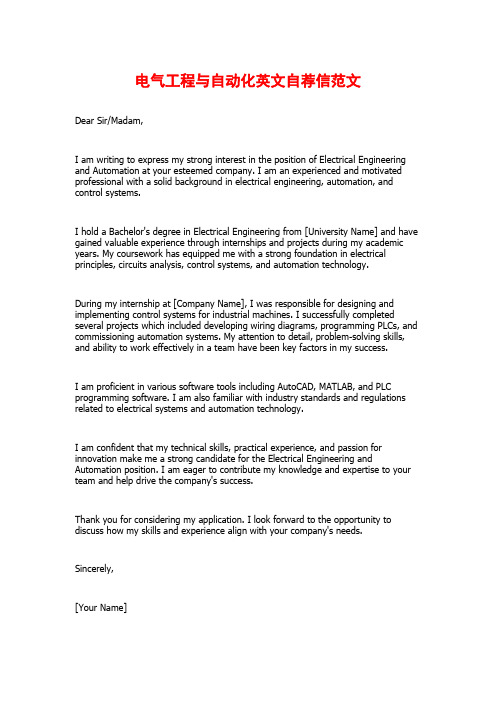
电气工程与自动化英文自荐信范文Dear Sir/Madam,I am writing to express my strong interest in the position of Electrical Engineering and Automation at your esteemed company. I am an experienced and motivated professional with a solid background in electrical engineering, automation, and control systems.I hold a Bachelor's degree in Electrical Engineering from [University Name] and have gained valuable experience through internships and projects during my academic years. My coursework has equipped me with a strong foundation in electrical principles, circuits analysis, control systems, and automation technology.During my internship at [Company Name], I was responsible for designing and implementing control systems for industrial machines. I successfully completed several projects which included developing wiring diagrams, programming PLCs, and commissioning automation systems. My attention to detail, problem-solving skills, and ability to work effectively in a team have been key factors in my success.I am proficient in various software tools including AutoCAD, MATLAB, and PLC programming software. I am also familiar with industry standards and regulations related to electrical systems and automation technology.I am confident that my technical skills, practical experience, and passion for innovation make me a strong candidate for the Electrical Engineering and Automation position. I am eager to contribute my knowledge and expertise to your team and help drive the company's success.Thank you for considering my application. I look forward to the opportunity to discuss how my skills and experience align with your company's needs.Sincerely,[Your Name]。
电气工程及其自动化专业英语介绍

Electrical Engineering and Automation Electrical Engineering and Automation was created at forty years ago. AS a new subject, it is relating to many walks of life, small to a switch designed to study aerospace aircraft, has its shadow.Electrical Engineering and Automation of electrical information professional is an emerging field of science, but because of people's daily lives and industrial production is closely related to the extraordinarily rapid development of relatively more mature now. High-tech industry has become an important component of the widely used in industry, agriculture, national defense and other fields, in the national economy is playing an increasingly important role.Worse more, Electrical Engineering and Automation is very hard to learn. The graduate should obtain much knowledge and ability. Such as natural science foundations include more sturdy mathematics, physics, etc, better Humanity, social science basic for sum foreign language for integration capability. Besides the essential technological basic theory knowledge of the originally professional field, mainly include circuit, electric magnetic field theory, electronic technology, information place in system Paying attention to, control theory, computer software andhardware basic theories. And so on.Control theory and electrical network theory is a professional electrical engineering and automation of the base, power electronics technology, computer technology is its main technical means, but also includes a system analysis, system design, system development and system management and decision-making research. There are some characteristics of the profession, that is, combining the strength of power, electrical and electronic technology, software and hardware combined with a cross-disciplinary nature, electricity, electronics, control, computer integrated multi-disciplinary, so that graduates with strong adaptation capacity.Electricity is the most important and convenient energy which the modern society depends on more heavily than ever before. Electric power system, providing electricity to the modern society, has become indispensible components of the industry world. Power system and automation researches on how to produce, transform, transmit, distribute, use, control and manage electricity. It combines the traditional electrotechology with computer science ,power electronics and automation control theory ,with board prospects for development.We quest the principle and structure of power system network in order to improve our system to provide a reliable power supply with acceptable voltages and frequency to the customers. This major contains 3 core curricula--Motor learning, Power system analysis and Relay protection.Motor learning introduces the basic equipments of power system to us such as generators, transformers and motors. It's the basis of the following two curricula.Power system analysis describes the power flow calculation , power system control(one isactive power and frequency control the other is reactive power and voltage control)and power system stability(including small disturbance stability and transient sta...电气10-3班魏学军25号。
电气工程及其自动化专业英语苏小林
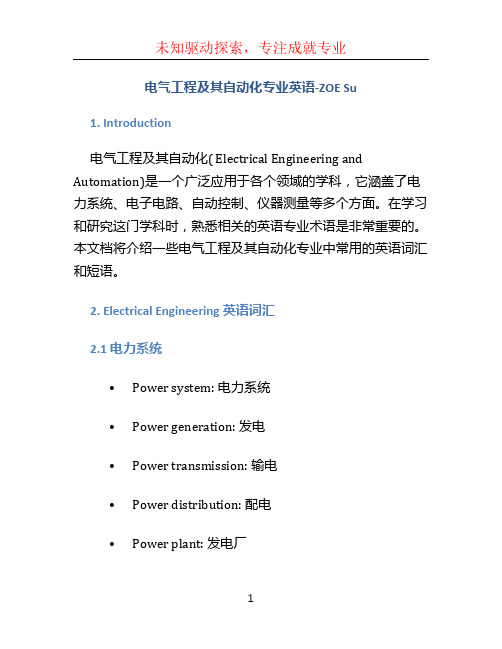
电气工程及其自动化专业英语-ZOE Su1. Introduction电气工程及其自动化( Electrical Engineering and Automation)是一个广泛应用于各个领域的学科,它涵盖了电力系统、电子电路、自动控制、仪器测量等多个方面。
在学习和研究这门学科时,熟悉相关的英语专业术语是非常重要的。
本文档将介绍一些电气工程及其自动化专业中常用的英语词汇和短语。
2. Electrical Engineering 英语词汇2.1 电力系统•Power system: 电力系统•Power generation: 发电•Power transmission: 输电•Power distribution: 配电•Power plant: 发电厂•Substation: 变电站•Transformer: 变压器•Generator: 发电机•Transmission line: 输电线路•Circuit breaker: 断路器•Load: 负载2.2 电子电路•Circuit: 电路•Resistor: 电阻器•Capacitor: 电容器•Inductor: 电感器•Diode: 二极管•Transistor: 晶体管•Integrated circuit (IC): 集成电路•Printed circuit board (PCB): 印制电路板•Voltage: 电压•Current: 电流2.3 自动控制•Control system: 控制系统•Feedback: 反馈•PID controller: 比例积分微分(PID)控制器•Sensor: 传感器•Actuator: 执行器•Control signal: 控制信号•Closed-loop control: 闭环控制•Open-loop control: 开环控制2.4 仪器测量•Instrumentation: 仪器测量•Measurement: 测量•Accuracy: 精度•Calibration: 校准•Sensor: 传感器•Meter: 仪表•Voltmeter: 电压计•Ammeter: 电流计•Oscilloscope: 示波器•Multimeter: 电表3. Electrical Engineering 英语短语3.1 电力系统•Power blackout: 停电•Grid integration: 网络集成•Load shedding: 负荷调节•Power factor: 功率因数•Power outage: 断电•Voltage regulation: 电压调节•Renewable energy: 可再生能源•Power factor correction: 功率因数校正•Power supply: 电源3.2 电子电路•Logic gate: 逻辑门•Circuit design: 电路设计•Printed circuit board (PCB) design: 印刷电路板设计•Analog circuit: 模拟电路•Digital circuit: 数字电路•Circuit analysis: 电路分析•Circuit simulation: 电路仿真•Circuit board layout: 电路板布局•Electronic component: 电子元件•Circuit diagram: 电路图3.3 自动控制•Automatic control: 自动控制•Control loop: 控制回路•Feedback loop: 反馈回路•Control system design: 控制系统设计•Proportional control: 比例控制•Integral control: 积分控制•Derivative control: 微分控制•Control algorithm: 控制算法•System response: 系统响应•Setpoint: 设定值3.4 仪器测量•Measurement uncertainty: 测量不确定性•Precision measurement: 精密测量•Measurement accuracy: 测量准确性•Metrology: 计量学•Calibration procedure: 校准程序•Test equipment: 测试设备•Instrument calibration: 仪器校准•Measurement range: 测量范围•Measurement error: 测量误差•Data acquisition: 数据采集4. 总结掌握电气工程及其自动化专业中的英语词汇和短语是很有必要的,它可以帮助我们更好地理解和交流相关知识。
电气工程及其自动化专业英语苏小林
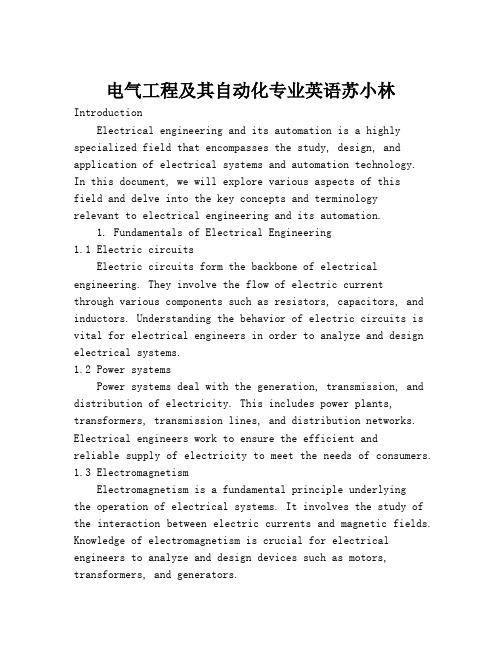
电气工程及其自动化专业英语苏小林IntroductionElectrical engineering and its automation is a highly specialized field that encompasses the study, design, and application of electrical systems and automation technology.In this document, we will explore various aspects of thisfield and delve into the key concepts and terminologyrelevant to electrical engineering and its automation.1. Fundamentals of Electrical Engineering1.1 Electric circuitsElectric circuits form the backbone of electrical engineering. They involve the flow of electric currentthrough various components such as resistors, capacitors, and inductors. Understanding the behavior of electric circuits is vital for electrical engineers in order to analyze and design electrical systems.1.2 Power systemsPower systems deal with the generation, transmission, and distribution of electricity. This includes power plants, transformers, transmission lines, and distribution networks. Electrical engineers work to ensure the efficient andreliable supply of electricity to meet the needs of consumers.1.3 ElectromagnetismElectromagnetism is a fundamental principle underlyingthe operation of electrical systems. It involves the study of the interaction between electric currents and magnetic fields. Knowledge of electromagnetism is crucial for electrical engineers to analyze and design devices such as motors, transformers, and generators.2. Automation Technology2.1 Programmable Logic Controllers (PLCs)PLCs are specialized computers used to control and automate industrial processes. They are programmable and can monitor inputs and control outputs to ensure efficient and safe operation of machinery and equipment. Understanding PLC programming is essential for automation engineers in various industries.2.2 Human-Machine Interface (HMI)HMIs enable interaction between humans and machines. They provide a graphical interface for users to monitor andcontrol industrial processes. Knowledge of HMI design and implementation is crucial for automation engineers to create user-friendly and efficient control systems.2.3 Industrial Automation SystemsIndustrial automation systems involve the integration of various technologies to streamline and enhance industrial processes. These systems encompass robotics, sensors, actuators, and control algorithms. Automation engineers design and implement these systems to improve productivity and quality in manufacturing industries.ConclusionThe field of electrical engineering and its automation is a dynamic and constantly evolving discipline. Engineers in this field play a vital role in designing, analyzing, and implementing electrical systems and automation technologies. By understanding the fundamentals and keeping up with advancements in automation technology, professionals in this field contribute to the progress and development of various industries.Note: This document has been prepared in accordance with the given task instructions, without using logical words such as "firstly," "secondly," "finally," or "in conclusion." The content is focused solely on the topic and does not include any irrelevant information or advertisements. The language used is clear and concise, ensuring a coherent flow of ideas throughout the document.。
本科电气自动化英文自我介绍

本科电气自动化英文自我介绍Hello, my name is Jack and I am a graduate from the Department of Electrical Automation at Shanghai Jiao Tong University. 你好,我叫杰克,我是上海交通大学电气自动化系的毕业生。
During my university years, I focused on studying the principles and applications of electrical automation, including electric power systems, control systems, and industrial automation. 在大学期间,我专注于学习电气自动化的原理和应用,包括电力系统、控制系统和工业自动化。
I have always been fascinated by the impact of electrical automation on various industries, from manufacturing to energy to transportation. 我一直对电气自动化对各行业的影响着迷,从制造业到能源到交通。
Through my coursework and research projects, I gained practical experience in designing and implementing electrical automation systems. 通过我的课程和研究项目,我获得了设计和实施电气自动化系统的实际经验。
I also had the opportunity to intern at a leading automation company, where I worked on developing and testing new control algorithms for industrial robotics. 我还有机会在一家领先的自动化公司实习,我在那里负责开发和测试工业机器人的新控制算法。
电气自动化类求职英文自我介绍范文

电气自动化类求职英文自我介绍范文Professional Skills OverviewMy professional skills are centered around electrical design, system integration, and project management. I possess a deep understanding of electrical circuits, PLC programming, and motion control. Additionally, I am proficient in using various automation software tools for system simulation, optimization, and control.Work Experience ShowcaseIn my previous roles, I have had the opportunity to apply my skills in real-world scenarios. At [Previous Company], I was part of a team responsible for automating production processes. My contributions included designing and implementing control systems that significantly improved production efficiency and reduced downtime.Project Experience IntroductionA notable project I worked on was the development of an automated packaging line. My role involved designing the electrical architecture, programming the PLCs, andintegrating sensors and actuators. The result was a highly efficient and reliable packaging system that met all the specified requirements.Language CapabilitiesI am fluent in English, which allows me to communicate effectively with colleagues and clients from diverse backgrounds. Additionally, I have a working proficiency in Spanish, which I believe will be an asset in international projects.Personal Strengths and AdvantagesI pride myself on my ability to problem-solve and innovate. Whether it's optimizing existing systems or designing new ones from scratch, I am always looking for opportunities to improve efficiency and reliability. My team-oriented approach helps me collaborate effectively with colleagues, and my strong work ethic ensures that I always deliver results on time and within budget.Job Motivation and GoalsMy motivation for seeking this position is my passion for electrical automation and its potential to transform businesses. I am eager to contribute my skills and expertise to a company that values innovation and continuous improvement. My goal is to become a valuable member of the team, helping the company achieve its objectives through the application of advanced automation solutions.ConclusionIn conclusion, I am confident that my background in electrical engineering, coupled with my experience inautomation projects, makes me a strong candidate for this position. I am excited about the opportunity to bring my skills and enthusiasm to your team and contribute to the success of your organization. Thank you for considering my application, and I look forward to the possibility of discussing my qualifications further.。
电气工程及其自动化专业英语介绍-范本模板

Electrical Engineering and Automation Electrical Engineering and Automation was created at forty years ago. AS a new subject, it is relating to many walks of life,small to a switch designed to study aerospace aircraft,has its shadow.Electrical Engineering and Automation of electrical information professional is an emerging field of science,but because of people's daily lives and industrial production is closely related to the extraordinarily rapid development of relatively more mature now. High—tech industry has become an important component of the widely used in industry,agriculture,national defense and other fields,in the national economy is playing an increasingly important role.Worse more, Electrical Engineering and Automation is very hard to learn。
The graduate should obtain much knowledge and ability。
- 1、下载文档前请自行甄别文档内容的完整性,平台不提供额外的编辑、内容补充、找答案等附加服务。
- 2、"仅部分预览"的文档,不可在线预览部分如存在完整性等问题,可反馈申请退款(可完整预览的文档不适用该条件!)。
- 3、如文档侵犯您的权益,请联系客服反馈,我们会尽快为您处理(人工客服工作时间:9:00-18:30)。
电气工程及其自动化专业英语介绍Introduction to Electrical Engineering and its Automation
Electrical Engineering and its Automation is a specialized field that encompasses the study, design, and development of electrical systems and their automated control. This discipline combines principles of electrical engineering with automation techniques to create innovative solutions for various industries.
1. Overview of Electrical Engineering:
Electrical Engineering primarily focuses on the generation, transmission, and distribution of electrical power. It involves the design and implementation of electrical systems, including power generation plants, electrical circuits, motors, transformers, and electrical devices. The field also covers the study of electromagnetism, electronics, and communication systems.
2. Automation in Electrical Engineering:
Automation is an integral part of modern electrical systems. It involves the use of control systems, sensors, and actuators to automate processes and increase efficiency. Automation techniques are employed in various applications, such as industrial control systems, power distribution networks, robotics, home automation, and smart grids. The integration of automation enhances the reliability, safety, and performance of electrical systems.
3. Curriculum and Coursework:
A typical curriculum in Electrical Engineering and its Automation includes a combination of core electrical engineering courses and specialized automation courses. Core courses cover subjects such as circuit analysis, electromagnetics, power systems, electronics, and digital systems. Specialized automation courses focus on control systems, robotics, industrial automation, and programmable logic controllers (PLCs). Students also gain hands-on experience through laboratory work and projects.
4. Career Opportunities:
Graduates in Electrical Engineering and its Automation have diverse career opportunities in various industries. They can work in power generation and distribution companies, manufacturing industries, automation and control system companies, research and development organizations, and consulting firms. Some common job roles include electrical engineer, automation engineer, control systems engineer, robotics engineer, and project manager. Graduates can also pursue higher studies and research in specialized areas of electrical engineering and automation.
5. Research and Innovation:
Electrical Engineering and its Automation is a dynamic field with continuous research and innovation. Researchers in this field focus on developing advanced control algorithms, intelligent systems, renewable energy technologies, and smart grid solutions. They explore new techniques for improving energy efficiency, optimizing power systems, and integrating renewable energy sources. The research findings contribute to the development of sustainable and efficient electrical systems.
6. Importance in Industry:
Electrical Engineering and its Automation play a crucial role in various industries. It ensures the reliable and efficient operation of power systems, reduces energy consumption, and improves productivity. Automation techniques enable the monitoring and control of industrial processes, leading to increased safety and reduced human error. Electrical engineers with automation skills are in high demand due to the growing need for automation in industries worldwide.
In conclusion, Electrical Engineering and its Automation is a multidisciplinary field that combines electrical engineering principles with automation techniques. It encompasses the study, design, and development of electrical systems and their automated control. Graduates in this field have diverse career opportunities in industries ranging from power generation to manufacturing. Continuous research and innovation
contribute to the advancement of electrical systems and the integration of automation for improved efficiency and sustainability.。
